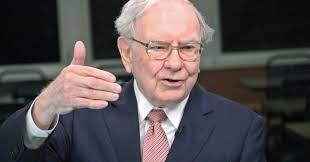The Intended Purpose of the Stock Market
The Intended Purpose of the Stock
Market
By E. Stanley Ukeni
In response to pointed question
by a Chinese investor, during the Berkshire Hathaway annual shareholder’s
meeting on Saturday, the 6th of May, 2017, the oracle of Omaha,
Warren Buffett, suggested that some investor—most often unseasoned investors,
treat the stock market as if it’s a gambling house, when he was asked about the
volatility in the Chinese stock market.
“Markets have a casino
characteristic that has a lot of appeal to people—particularly when they see
people getting rich around them,” Warren Buffett retorts. “And those who
haven’t been through cycles before are more prone to speculate than people who
have experienced the outcome of wild speculation.”
Mr. Buffett continued, “If the
market gets hot and people on leverage are doing well, a lot of people will be
attracted not only to what I call speculation but what I call gambling.”
“…there’s nothing more
agonizing than to see your neighbor who you think has an IQ 30 points below you
getting rich buying stocks,” Mr. Buffett joked.
His sage remark got me thinking
about the original intent and purpose of the stock market and how, over the
years, novel idea of aggregating capital to where it is needed in other to fund
business expansion and innovations has been eclipsed by the lure of greed and
avarice.
So I thought it’d be
interesting to explore the genesis and original purpose, and the exploitative
evolution, of the stock market.
I would describe the stock
market as equity trading platform where individuals can invest some of their
wealth towards providing needed financial liquidity for businesses to grow and
expand, and at the same time, for these capital investors to be able to profit
from their investment in the ingenuity and productivity of these
companies.
I am of the opinion that the
primary aim of this equity trading platform is to encourage business diversity
and innovation through capital investment incentives. The financial incentive
serves a secondary purpose of encouraging businesses to continue to innovate
and improve productivity.
The resultant effects—in the
form of efficiency, innovations or inventions, of the funding provided by
investors are meant to improve corporate profitability—thereby increasing the
company’s valuation, and as a consequence, the value of the investor’s equity
position in the business.
On a much broader socioeconomic
prospective, the stock market serves as a medium for the working class to grow
their hard earned savings, with the promise of enhancing their financial
position in the future, by investing their funds in perceived lucrative
enterprises—and being able to leverage their equity positions for higher
financial reward.
This helps maintain a dynamic
consumer middle class needed to keep an economy vibrant. Investing in the stock
market also incentivizes the workforce to focus on their unique expertise, thus
eliminating the financial motivation for key professionals venture into saturated
sectors of an economy where they deem more financially lucrative—thereby causing
an unintended deficit in requisite sectors of society where their particular
expertise are most needful.
In essence, the stock market
was envisaged as an avenue for the average member of society to profit from the
growth sector of the economy, without their having to abandon their profession
to do so—ensuring that the productive population of society, who are willing to
leverage a portion of their earnings, enjoy a relatively high standard of
living.
The stock market works well
under a strict free enterprise system. However, when the stock market is
allowed by government regulators to be turned into a de facto gambling casino by stockbrokers, fund managers and regular
investors then the equity trading platforms becomes a mere speculative
instrument—which would eventually crash under the weight of the irrational
exuberance of speculators.
The ensuing social and
financial crisis that will be caused by a major stock market crash would
undoubtedly systematically undermine social cohesiveness, leading to a decline
standard of living and quality of life.
Of course, some will argue that
this is a simplistic view of the stock market…perhaps insisting that the stock
market has long evolved into an instrument for political systems to maintain
economic primacy in global trade and commerce. Sure, there is truth to this
notion, but this is not the topic of this article.
In closing, I’d like to proffer
a warning that the current distorting of stock prices, by unscrupulous investors,
who are hell-bent on manipulating stock valuations for selfish ends, might inadvertently
catalyze a stock market collapse, in the not too distant future.
Authored by E. Stanley Ukeni, ©
2017. All Rights Reserved. This material and other articles or stories posted
on this blog site may not be reproduced, published, broadcast, rewritten or
redistributed, in whole or in part, without prior expressed written permission
from the author, E. Stanley Ukeni.
You are invited to follow E.
Stanley Ukeni on twitter at; @EzStan . You’re equally invited to follow him on
google+. Oh yeah, don’t forget to subscribe to this blog Site. Thanks.
Photo
Credits: Berkshire Hathaway;






Insightful article Stanley. I for one have observed situations in past years of startup companies manipulating the value of their companies to drive the stock up, so I'm sure it's done with larger companies.
ReplyDelete